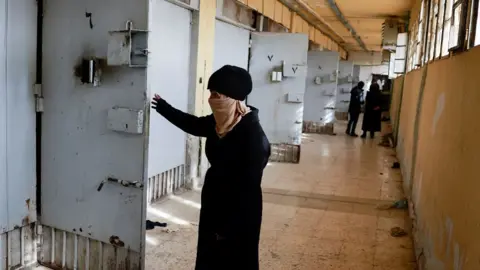 Reuters
ReutersSyrian opposition forces say they plan to close a notoriously harsh prison run by ousted President Bashar al-Assad and hunt for those responsible for killing and torturing detainees.
In a statement seen by Reuters, rebel leader Ahmed al-Shallah, also known as Abu Mohammed al-Jolani, also said he would disband the former regime’s security forces.
After the fall of Assad’s regime on Sunday, a video was released showing thousands of prisoners being released from Saidnaya prison, which human rights groups have described as a “human slaughterhouse”.
The Syrian Observatory for Human Rights, a UK-based monitoring group, said around 60,000 people had been tortured and killed in prisons run by the Assad regime.
Jolani’s Islamic militant group Hayat Tahrir al-Sham (HTS) led other Syrian opposition groups in a blitzkrieg attack that toppled the Assad dynasty’s 54-year rule.
Assad fled to Russia early Sunday after rebels took control of the capital Damascus, where he and his family have been granted asylum.
In a separate statement, Jolani said amnesty for those who took part in torturing and killing prisoners was out of the question.
“We pursue them in Syria and call on states to hand over the fugitives to achieve justice.”
Since the fall of President Bashar al-Assad, Syrians have flooded into the regime’s notorious prisons, desperately searching for their loved ones. The Turkey-based Association of Detainees and Missing Persons in Saidnaya Prison (ADMSP) said in a 2022 report that since the civil war began in 2011, Saidnaya “has effectively become a death camp.” Ta.
Jolani also said he would disband the security forces of the former Assad regime. It is unclear how quickly the rebels will be able to regroup, amid concerns about Israeli attacks on military infrastructure.
In a statement seen by Reuters, Jolani said his group was working with international organizations to secure potential chemical weapons emplacements.
Asked about the Reuters report, Pentagon deputy spokeswoman Sabrina Singh said the United States “welcomed” Jolani’s words but said it needed to respond with action.
“Our focus is to keep these chemical weapons out of the wrong hands,” she added.
This came after Israel carried out hundreds of attacks across Syria and seized many military assets.
Local media reported that one of the attacks targeted a research center suspected of being linked to chemical weapons production.
Israel said it was acting to prevent weapons “from falling into the hands of extremists.”
Chemical weapons are described by the United Nations’ chemical watchdog, the Organization for the Prohibition of Chemical Weapons (OPCW), as chemicals that are used intentionally to cause death or harm due to their toxicity.
Its use is prohibited by international humanitarian law.
From 2013 to 2018, Human Rights Watch documented at least 85 chemical weapons attacks in Syria, most of which it blamed on the ousted government.
Assad’s regime has denied using chemical weapons.
Syria signed the OPCW’s certificate of use of chemical weapons in 2013, a month after a chemical weapons attack on the outskirts of Damascus killed more than 1,400 people.
It is unclear how many chemical weapons Syria has, but it is believed that Assad has stockpiled them and his declaration was incomplete.
Victims of chemical attacks in Syria recently spoke to the BBC about the devastating effects they experienced.
Meanwhile, European foreign ministers are scheduled to meet in Berlin on Thursday for important talks on Syria and Ukraine.
The following day, G7 leaders will also meet virtually to discuss the latest developments in Syria, the White House said.




